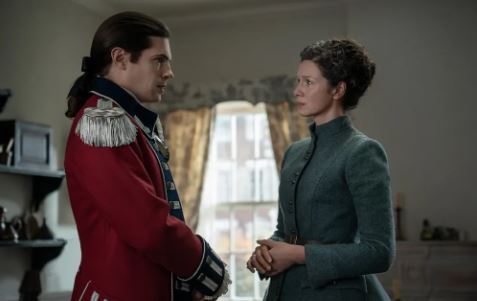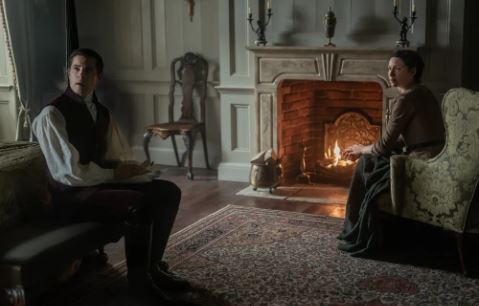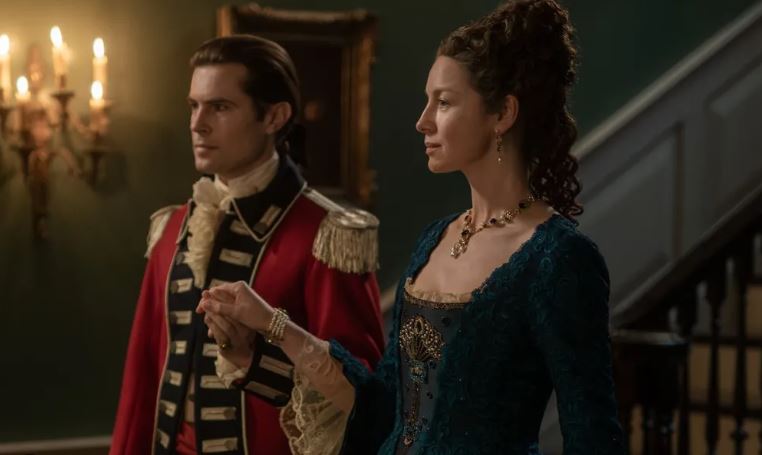SPOILER ALERT: This post contains spoilers from the “Outlander” Season 7, Part 2 episode, “A Hundredweight of Stones,” now streaming on Starz, and the Diana Gabaldon’s book, “A Echo in the Bone.”
David Berry recalls that penciled into the margin of the scripts for this week’s episode of “Outlander” was a reminder of the tone they needed to strike: “the worst wedding ever.”
To be fair, it wasn’t something anyone was going to forget. For the second time in the series’ 10-year run, Claire (Caitriona Balfe) stood at the altar against her will, opposite a man who she is told she must marry or risk a threat to her life. At the end of last week’s episode, a messenger informs Claire that her husband Jamie (Sam Heughan) has been lost at sea on his way to the American Colonies. But almost immediately, his friend (and not-so-secret admirer) Lord John Grey (Berry) breaks the news that she is also wanted for treason for assisting in espionage for the Continental Army, and he graciously offers to marry her as a Loyalist to save her from being arrested.
This is the third marriage for Clarie overall, all of which she later admits have been “unconventional” at best. But Balfe says this one is, indeed, the worst.

“I think Claire appeared equally as miserable for her Jamie wedding, although secretly happy inside,” she tells Variety. “Outwardly very miserable then, and certainly miserable now. I think she is just numb now. She is in the process of shock. It is purely functional — this is to save her. She is at that stage of grief where she doesn’t quite know what to think or feel, and I think she expects to feel something different than she does. And the fact that she doesn’t feel it is a source of betrayal of her own self. It is not a very happy occasion.”
Even talking about it now is not easy, so Heughan jumps in to lighten the mood: “After three times, she should have gotten the hang of it,” he jokes, putting a smile on Balfe’s face.
But it is Berry, who stands opposite Balfe at the altar, who has an even more candid assessment of the scene.
“It’s horrible, to be honest,” he says. “[For Lord John] to be the person who makes the proposal and who is willing it forward, against another person who is just so dead against it and dead inside, it is just a horrible experience for both of them. To give your vows to someone like that is just horrible.”
Balfe did find the formality of the vows, which Claire can barely muster enough strength to verbalize as commanded, to be especially painful. “It is cruel, if you think about it, that right after losing her husband, she is being forced to say those words,” she says. “They could have just done the “I Dos,’ but no. To make her say all of that is very cruel.”
Fans of author Diana Gabaldon’s books on which the show is based have been waiting for this moment for seasons, as the whirlwind of events depicted in this episode close out the seventh book, “An Echo in the Bone.” But just as quickly as Jamie is seemingly snatched from Claire’s life yet again, he reappears in the final moments of the episode, having missed the departure of the doomed ship. Only his luggage now rests in a watery grave.
But it isn’t just a traumatic wedding that he will have to reckon with after his absence. Upon sharing their vows, as reluctant as the ceremony may have been, Claire and Lord John wrestled their grief into submission — at least for a moment — by having a violent night of sobbing and drunken sex. They awake the next morning in the awkward afterglow of their unexpected new physical relationship, and it is not to a sudden realization of unknown passion.
Both Claire and Lord John are stunned by the events, acknowledging they both did it as a means of trying to be closer to the memory of Jamie. Then, in a surprisingly honest moment of pillow talk, they vocalize their shared fondness for a certain Highlander and, more specifically, talk about Lord John’s own sexual history as a closeted gay man in a time when his romantic preferences were a crime.

Balfe praises Berry’s “beautiful” performance in this episode, as Claire respectfully interrogates him about a life lived in secret. It was a moment of intimacy on set that called for the show’s long-time intimacy coordinator Vanessa Coffey to work with Balfe and Berry.
“That is such a strange, surprising element of this,” Balfe says. “Sam and I have obviously worked together for many years, and have a shorthand and a deep understanding of our characters and their relationship. But this was something that was so out of left field and new. I am very grateful to have had all these people for this episode.”
Berry, similarly, noted the delicacy of the moment. However, he expressed some disappointment with the final scene that audiences see in the episode.
“It has been cut in a way that, I think, I wished it would have been pushed a little further,” he says. “There are things about it that I think are kind of missing. In my interpretation of it, I wanted it to be more of an intimate moment. There are bits that are cut out that are from the book that I wish were still in there. And when I first read it, I thought it was a really great and interesting moment between these two characters of going through this traumatic event, connecting in a traumatic way and then trying to make sense of what has happened.”
While Berry didn’t specify what from the book he felt was missing, Gabaldon’s original scene was longer and more awkwardly comical in some ways. Among the material cut for the screen is a notable moment of vulnerability where Lord John asks Claire to show him her naked body, and he in turn shows her his. He explains this as mere curiosity, as he doesn’t have much experience with women since he lost his wife years before –– and even though were physical unless necessary. When Claire obliges, he praises her “very lovely” figure (even though she initially thinks his response is a placation of her age), and she notes, somewhat to her surprise, that he has a “warrior’s body.” Also, in Gabaldon’s novel, he shares the white deer metaphor at his plantation almost word for word as he does in the show. However, his final line in the scene — “Think of the deer, my dear” — is delivered in response to their conversation about Claire’s history as a time traveler, not about what may lie ahead for them. Lord John doesn’t quite believe the tale he first heard from Brianne (Sophie Skelton), but he assures his new bride that her supposed secret is safe.
While Claire and Lord John have always been friendly because they both care deeply for Jamie, his unrequited affection toward Jamie has always put them in a quiet opposition. The bedroom scene, along with their night of grief through sex, is something that Berry sees as helping bridge their divide.
“I take something else out of this scene now,” he says. “It is a really cool way of seeing Lord John as an entity unto himself. That he is not doing these actions just out of some kind of obsession with Jamie. He does have his own life and agency. Although it is through a muddy metaphor, and I’m not sure I ever quite figured it out, he is the white deer. He has an independence and he has a lover aside from Jamie. And the way we understand his obsession with Jamie is a lot more fleshed out and more nuanced, and I think Claire comes to respect him in a new way. She is forced to reconcile that this man is not just some sycophant or simp for Jamie, he is his own complex man who has his own motivations that are selfless but he also has his own needs.”
Claire and Lord John’s relationship isn’t magically strengthened by one night in the sheets, though. Even in the moment, her questions about his relationship with a cook at his Mount Josiah plantation in Virginia exposes some of Claire’s own biases of understanding the struggles for people outside of her own frame of reference.
“I think Claire can come across as a bit too progressive for her time,” Berry says. “And I think her own biases and presumptions about what it means to be a gay man are really tested here. She thinks he must operate this one way, but then she asks him, ‘Does this other man care as deeply about you?’ Lord John is amused by the question. He just says, ‘No,’ and she has a real chasm of understanding there. The way they close this chasm is by connecting over this and the individual grief over losing Jamie.”
Later in the episode, as Claire settles into her new life as Lady John Grey, the new couple find themselves diametrically opposed over his nephew Henry’s intention to abdicate his duty in England and marry Mercy Woodcock (Gloria Obianyo), a freed Black woman who has been nursing him back to health after Claire performed surgery to remove a musket ball from his stomach. Lord John immediately rebukes the relationship, and Claire later calls him a bigot for it. But Lord John rather effectively reminds Claire that her marriage to Jamie has always been accepted no matter what continent they step on. She doesn’t know what it is like to be in a relationship or want one that society will reject with prejudice or, worse, violence.
“A more central bias of John is knowing what it is like to live in fear of your love,” Berry says. “That is something Claire has never experienced, and that is a lesson that Lord John is able to teach Claire. I think that she comes to understand so much of who Lord John is, is motivated by fear and a need to protect the things around him that he treasures and loves.”
His forthright response to her progressive attitude eventually shows Claire she needs to play the part of Lady John Grey, and accept the safety her new husband has risked a great deal to provide her. But just as the two seem to find a happy medium, an alive-and-well Jamie storms into their home. Most fans won’t be shocked by this resurrection, as it would have been unprecedented to kill off one of TV’s long-standing romantic leads in a random episode. But Balfe says that is exactly what posed the greatest challenge for her, since Claire experiences a grief so deep and different than she’s even known that she contemplates suicide.

“For the audience, I don’t think anyone is going to believe that Jamie Fraser is really dead,” Balfe says. “So you sort of have to, for the character of Claire and to see her journey, make it feel really visceral and that she believes this her life now. I don’t know. It was a tough week of work, I’m not going to lie. I would wake up in the morning and think, ‘Oh, we are going to have to do this again.’”
As Jamie and Claire reunite, William Ransom (Charles Vandervaart), who was raised as Lord John’s son even though Jamie is his biological father, happens to hear the reunion and a reference to his true parentage. At the same moment, Redcoats barge into the home to arrest Jamie, who takes Lord John hostage in order to escape, leaving Claire in a state of happy shock. The episode ends as a smile creeps across her face, which is a far cry from the expressionless bride at the top of the hour.
Moving forward, Heughan warns fans that Jamie’s response to Claire and Lord John’s activities in his absence will be surprising and unkind.
“I was surprised by his response to Claire and John,” he says. “His brutality. But I guess that’s what makes him human, and I think the repercussions or the fracture in their relationship is really something Jamie and Claire have not dealt with in a long time.”
Heughan teases “a strong scene that is kind of a typical Jamie and Claire moment where they really hash it out” in next week’s episode. But notes the fallout will carry through “much of the season, and into Season 8.”
However, the most immediate victim of this chapter in the “Outlander” story is Lord John, who will have to process the violence committed against him by the man he has loved in secret for most of his life. “It unleashes a lot of anger and resentment in Lord John,” Berry says of what’s to come. “It damages their relationship in a fundamental way.”
